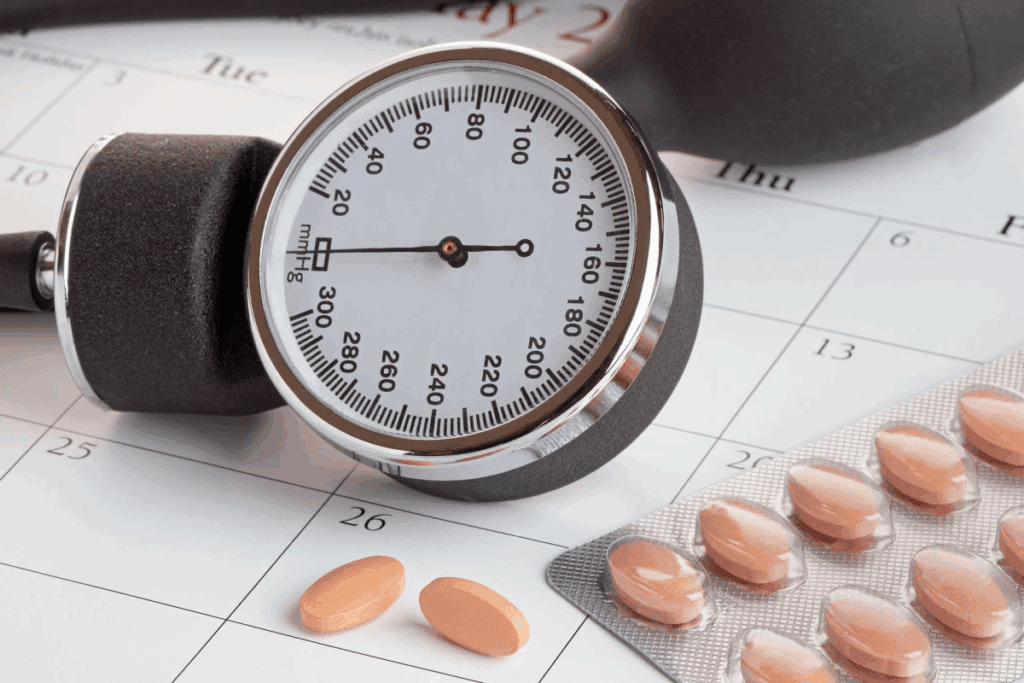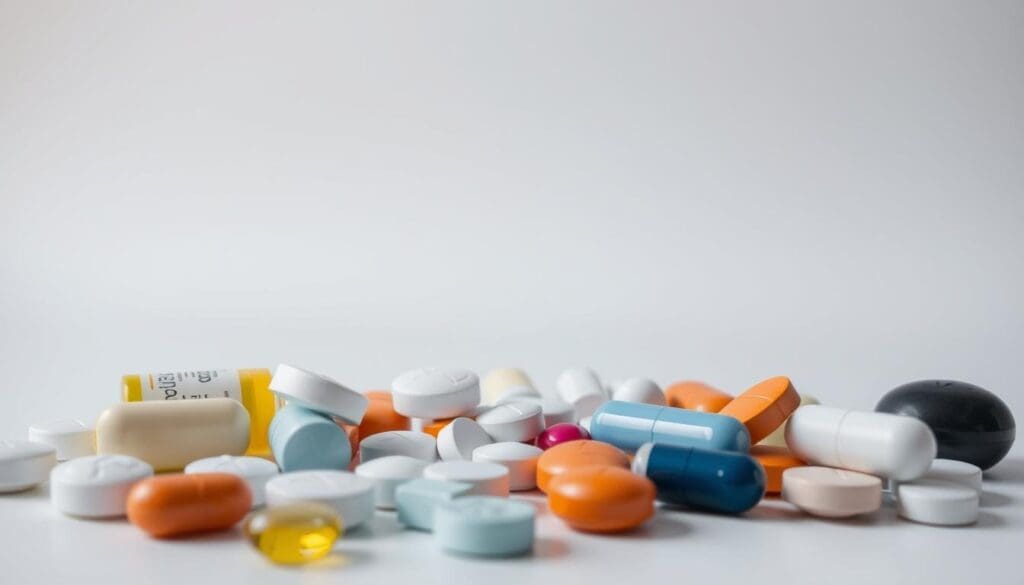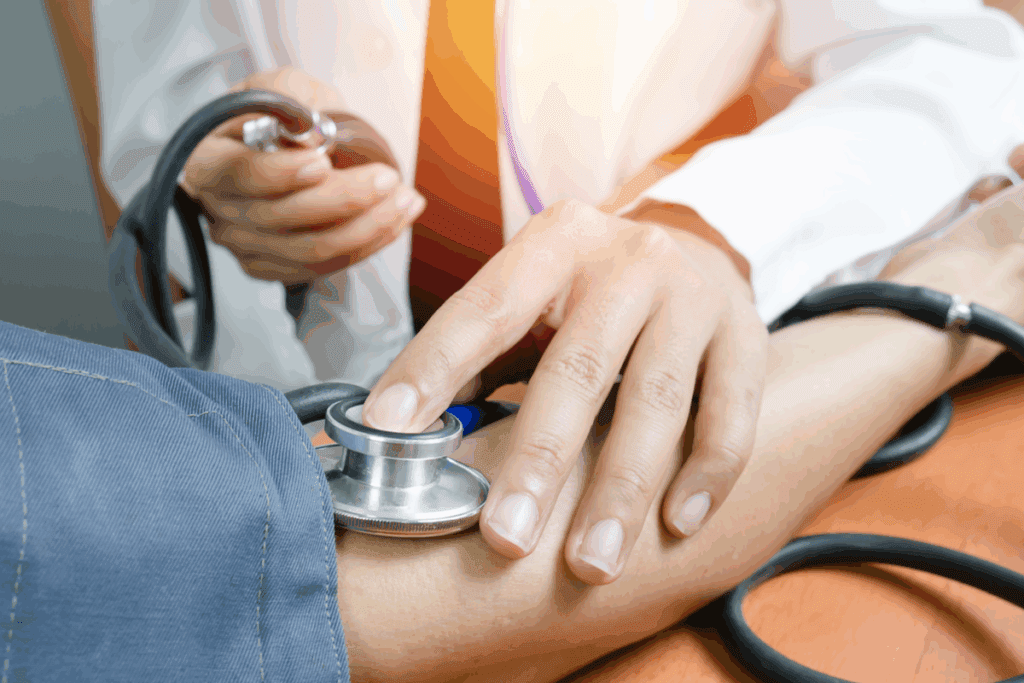Last Updated on October 31, 2025 by Bilal Hasdemir

Many men worry about how blood pressure medication affects their sex life, like erectile dysfunction. This is a big concern, and we need to look into how these drugs might affect ED. Does blood pressure medicine cause ed? Get the facts on the link between common antihypertensive drugs and erectile dysfunction.
High blood pressure itself can raise the risk of ED. But, some blood pressure drugs might also cause this problem. We’ll check which blood pressure medications might lead to ED and talk about other ways to treat high blood pressure without harming sex life.

It’s important to understand how blood pressure drugs and erectile dysfunction are linked. This connection affects many patients and their healthcare providers.
About one in five cases of erectile dysfunction are caused by blood pressure medications. Diuretics and beta-blockers are often linked to this issue. This shows why we need to look into this connection more.
Erectile dysfunction is a big problem for people taking blood pressure meds. It can really lower their quality of life. Some studies show that certain blood pressure drugs can make ED worse.
Research shows that medication-induced ED is a big worry, mainly with certain blood pressure drugs. Diuretics can mess with blood flow and erectile function. Beta-blockers can also affect blood flow and hormone levels, impacting sex life.
While the exact number of people affected by ED from blood pressure meds varies, it’s clear that medication-induced ED is a big issue. It needs careful management and looking into other treatment options.

Hypertension is a big risk for erectile dysfunction. It harms blood vessels and cuts off blood flow. Studies show a strong link between high blood pressure and erectile dysfunction.
Untreated high blood pressure can really hurt erectile function. Over time, it damages blood vessels. This makes them less flexible and unable to widen properly.
This damage cuts down blood flow to the penis. It makes it hard to get or keep an erection.
The way high blood pressure affects erectile function involves several key factors:
Untreated high blood pressure damages blood vessels, a big factor in erectile dysfunction. Damaged blood vessels can’t respond to signals for an erection. This makes it hard to get or keep an erection for sex.
Studies show men with untreated hypertension face a higher risk of erectile dysfunction. Controlling blood pressure through lifestyle changes and, if needed, medication is key to lowering this risk.
Understanding the connection between high blood pressure and erectile dysfunction helps individuals take action. They can manage their blood pressure and lower sexual dysfunction risk. This includes living a healthy lifestyle, checking blood pressure often, and following treatment plans.
Research shows a link between blood pressure meds and erectile dysfunction. This link involves both physical and mental factors. We must look at studies on blood pressure meds and their effects on sex.
Many studies have looked into the connection between blood pressure meds and ED. They found that some meds raise the risk of ED. But, the effect depends on the type of medication.
For example, diuretics and beta-blockers might lead to more ED cases. But, ACE inhibitors, calcium channel blockers, and angiotensin II receptor blockers might not have as big of an impact. Or, they might even help with sex.
Psychological factors are just as important as physical ones. The nocebo effect can make patients think they have side effects, including ED. This shows how important it is to talk about side effects with patients.
Studies show that telling patients about possible side effects can change how they report ED. This is why doctors should talk about these risks. It helps reduce the mental impact on sex life.
It’s key for doctors to understand both physical and mental sides of ED caused by meds. This way, they can give better care to patients with high blood pressure. By considering these factors, we can lessen the effect of meds on sex and improve patient results.
Diuretics are used to treat high blood pressure. They work by making you pee more, which lowers blood pressure. But, they might also affect your sex life, including erectile dysfunction (ED).
Thiazide diuretics are a common choice for high blood pressure. They reduce water in your body, which lowers blood pressure. But, they might increase the risk of erectile dysfunction.
The exact reason is not clear. But, it’s thought that they might change blood flow and lower testosterone levels. It’s important to talk to your doctor if you notice any changes in your sex life.
Other diuretics might not have the same effect on sex as thiazide diuretics. Loop diuretics and potassium-sparing diuretics are used too. But, there’s less research on how they affect sex compared to thiazide diuretics.
The effect of diuretics on sex can vary. Things like your health, the dose, and type of diuretic matter. If you’re having sex problems while taking diuretics, talk to your doctor.
Talking about sex can be hard, but it’s key to your health. Knowing how diuretics might affect sex helps us manage blood pressure without harming your sex life.
Beta-blockers are used to treat high blood pressure and heart conditions. But, they can also affect sexual performance in men. The use of beta-blockers in managing hypertension has raised questions about their effects on erectile function.
Beta-blockers block the hormone epinephrine and slow the heart rate. This can impact blood flow and hormone levels, leading to erectile dysfunction (ED). The impact on blood flow is significant because it’s key for an erection.
Studies show beta-blockers may lower hormone levels needed for erections. For example, they can reduce testosterone or affect blood flow. Both are important for maintaining an erection.
Not all beta-blockers are the same, and their effects on sex can vary. Older beta-blockers, like propranolol, may increase the risk of erectile dysfunction. Newer beta-blockers, like nebivolol, might have less impact on sex and could even help some men.
Newer beta-blockers work differently and may cause fewer sexual side effects. This is because they target specific actions in the body.
Talk to your doctor about beta-blockers and sex. They can give advice based on your health and needs.
Managing high blood pressure is key, and it’s important to think about how meds affect sex. Some blood pressure meds are better for sex health than others.
ACE inhibitors protect the heart and might not hurt sex life. They help lower blood pressure and could even help with sex. This is different from some other meds that might cause ED.
Calcium channel blockers help relax blood vessels. This can improve blood flow. Studies show they might be less likely to cause ED than other meds.
ARBs are good for high blood pressure and have fewer side effects. Some studies say ARBs might not cause ED and could even help with sex. This makes them a good choice for those worried about sex side effects.
Comparison of ED Risk Across Different Blood Pressure Medications:
| Medication Class | ED Risk | Notable Effects |
| ACE Inhibitors | Low | Neutral or positive effect on erectile function |
| Calcium Channel Blockers | Low | Improves blood flow |
| ARBs | Low | Potential improvement in sexual function |
| Beta-Blockers | Moderate to High | May affect hormone levels and blood flow |
| Diuretics | Moderate to High | Can cause dehydration, potentially worsening ED |
In summary, when picking blood pressure meds, think about sex health too. ACE inhibitors, calcium channel blockers, and ARBs are safer for sex and might have extra benefits.
Negative thoughts can really affect how well medical treatments work. This is called the nocebo effect. It’s very important when we talk about blood pressure medicine and erectile dysfunction (ED).
The nocebo effect happens when people feel bad because they expect to. It’s not because of the medicine itself. This can change how people report side effects, based on what they’re told.
The 31% vs. 3% Study: Understanding the Power of Suggestion
A study showed how big the nocebo effect can be with ED. Patients were split into two groups. One group was told about the risk of ED from blood pressure medicine. The other wasn’t.
The results were clear: 31% of those told about the risk said they had ED. But only 3% of those who weren’t told said the same.
This big difference shows how much expectations matter. When people are warned about side effects, they’re more likely to say they have them. Even if the medicine doesn’t really cause them.
Teaching patients is key to handling side effects and the nocebo effect. It’s important to tell patients about risks, but how you do it matters a lot.
Understanding the nocebo effect and its role in ED reporting helps doctors. They can teach patients in a way that focuses on both the good and bad of treatments. This can lead to better results for patients.
Managing erectile dysfunction (ED) and high blood pressure needs a team effort. Healthcare providers and patients must work together. This includes medication, lifestyle changes, and open talks.
Talking openly with your healthcare provider is key. Patients should share their symptoms and worries freely. This helps create a treatment plan that works for both conditions.
Some important things to discuss with your healthcare provider include:
Changing your high blood pressure medication might help with ED. Some blood pressure medications are better for sex. For example, switching to an ACE inhibitor or an Angiotensin II Receptor Blocker (ARB) might help.
| Medication Class | Effect on ED | Examples |
| ACE Inhibitors | Generally considered safe for sexual function | Lisinopril, Enalapril |
| ARBs | May have a positive effect on sexual function | Losartan, Valsartan |
| Beta-Blockers | Can potentially worsen ED | Metoprolol, Atenolol |
| Diuretics | May negatively impact sexual function | Hydrochlorothiazide |
Changing your lifestyle can help with both high blood pressure and ED. Regular exercise, a balanced diet, and managing stress are key. These changes can help control blood pressure and improve sex life.
Some good lifestyle changes include:
Good news for men with high blood pressure and erectile dysfunction. There are ED treatments safe to use with blood pressure drugs. Managing both conditions can be tough, but the right approach helps keep both health and function in check.
PDE5 inhibitors, like sildenafil (Viagra) and tadalafil (Cialis), are common ED treatments. They are usually safe for men on blood pressure medication. But, it’s important to take some precautions.
It’s key to know how PDE5 inhibitors work with blood pressure drugs. They can make blood pressure drop too low. But, this doesn’t mean they can’t be used together. It just means careful management is needed.
Let’s look at some possible interactions between ED treatments and blood pressure drugs:
| ED Treatment | Blood Pressure Medication | Potential Interaction |
| PDE5 Inhibitors | Nitrates | Severe hypotension |
| PDE5 Inhibitors | Alpha-blockers | Increased risk of hypotension |
| Tadalafil | Antihypertensive drugs | Minor additional BP reduction |
The table shows some combinations can cause big interactions. For example, mixing PDE5 inhibitors with nitrates is very dangerous. But, some combinations, like tadalafil with blood pressure drugs, might just lower blood pressure a bit more. This is usually okay.
It’s essential for men with high blood pressure and erectile dysfunction to talk to their doctor. They can find the safest and most effective treatment. By knowing the possible interactions and choosing wisely, men can manage both conditions well.
It’s important to balance blood pressure control and sexual health for overall well-being. We’ve looked at how blood pressure meds can affect erectile dysfunction (ED). We’ve also talked about the different types of blood pressure medications and their effects on sex.
Managing high blood pressure and sex health needs teamwork between patients and doctors. Knowing how different blood pressure meds work helps. This way, people can work with their doctors to find a plan that keeps blood pressure in check and reduces ED risk.
Ignoring high blood pressure can harm sex life too. So, it’s not about picking one over the other. It’s about finding a way to manage both well. Changes in lifestyle, adjusting meds, and trying new treatments can help find this balance.
Being open with doctors and learning about treatment options is key. This way, people can manage their blood pressure and protect their sex health. This approach is vital for good heart health and a better quality of life.
Some blood pressure medicines might lead to erectile dysfunction. But, it depends on the medicine and the person.
Diuretics, like thiazide diuretics, and beta-blockers might cause erectile dysfunction. But, not all medicines in these groups have the same risk.
ACE inhibitors are less likely to cause erectile dysfunction. They might even help improve sexual function in some cases.
Calcium channel blockers don’t usually increase the risk of erectile dysfunction. They could be a good choice for men with high blood pressure worried about ED.
ARBs are usually safe for erectile function. Some studies suggest they might even help improve sexual function.
Switching medications might help with erectile dysfunction symptoms. Always talk to your doctor before making any changes.
Managing ED and high blood pressure together involves talking to your doctor. You might need to adjust your medication or make lifestyle changes.
Yes, there are ED treatments that work with blood pressure medication. Always check with your doctor to make sure they’re safe for you.
Yes, lifestyle changes like exercise, a healthy diet, and stress reduction can help with both high blood pressure and erectile dysfunction.
The nocebo effect can make men more likely to report erectile dysfunction symptoms. Knowing about the possible side effects can influence how they feel.
National Center for Biotechnology Information. (2025). Does Blood Pressure Medicine Cause ED What You. Retrieved from https://www.ncbi.nlm.nih.gov/pmc/articles/PMC2646771
Subscribe to our e-newsletter to stay informed about the latest innovations in the world of health and exclusive offers!
WhatsApp us